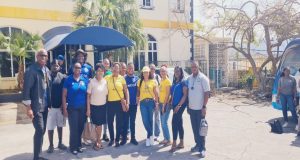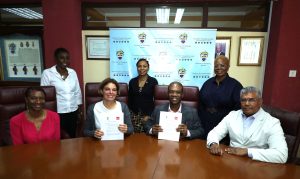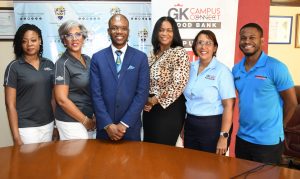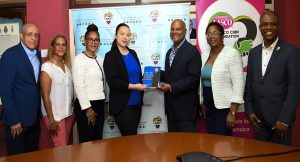The University of Technology, Jamaica, in partnership with the Caribbean Futures Forum, hosted a compelling virtual symposium titled “Sustainable Futures Symposium: Advancing a Caribbean Space Agenda,” on Thursday, June 5, 2025. The event brought together leading regional and international experts to explore the transformative potential of space technologies in addressing development challenges and achieving sustainable development goals.
The symposium emphasized the pressing need for Caribbean nations to move beyond being passive consumers of technology and instead become active contributors to the global space economy.
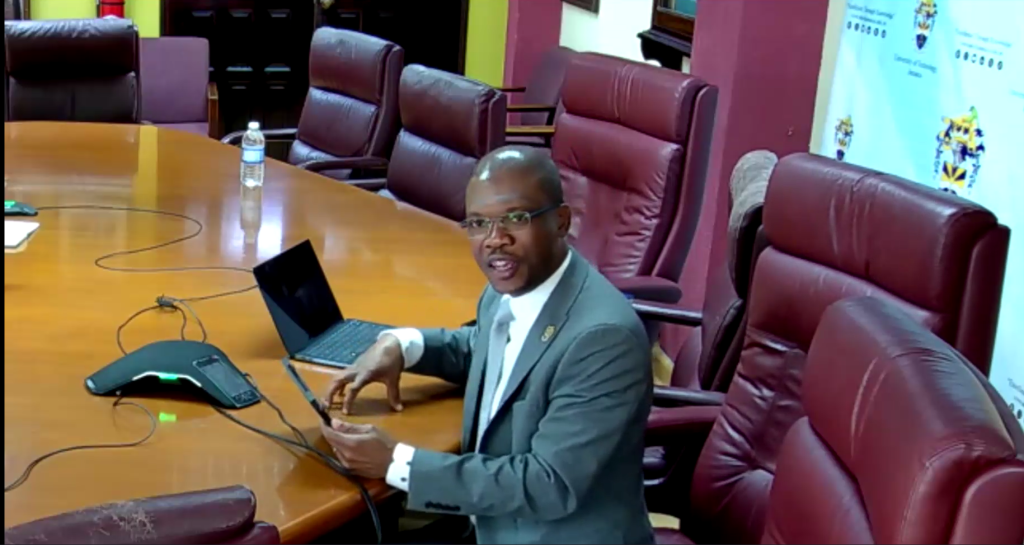
Dr. Kevin Brown, President, University of Technology, Jamaica delivers his welcome during the virtual “Sustainable Futures Symposium: Advancing a Caribbean Space Agenda” held on Thursday, June 5, 2025.
Dr. Kevin Brown, President, University of Technology, Jamaica in his welcome address, highlighted the timeliness of the symposium which coincided with United Nations World Environment Day. He noted that the forum provided “a unique moment to not only reflect on the urgent environmental challenges facing our planet, but also on the extraordinary possibilities that lie ahead in terms of using space as a platform for resolving some of these challenges.”
As Jamaica’s national STEM university with a strong research mandate, Dr. Brown stated that UTech, Jamaica is “keen on leading research and understanding the collective roles we in the Caribbean must play to ensure that we are not merely bystanders in the global space economy, but active architects of the future.”
Dr. Brown, a former aerospace engineer with Rolls Royce for over a decade, drawing on his background in the global aerospace industry, underscored the need for the Caribbean to take its place as an innovator in the space economy. He called for Caribbean nations to “join in the space race” to solve societal problems, emphasizing that space technologies can be leveraged to tackle issues like climate change, increasing hurricane activity, food security, and urban planning. Stressing that this is a regional, not just a national imperative, Dr. Brown shared, “When we’re united, we’re stronger; when we share resources, we get things done.”
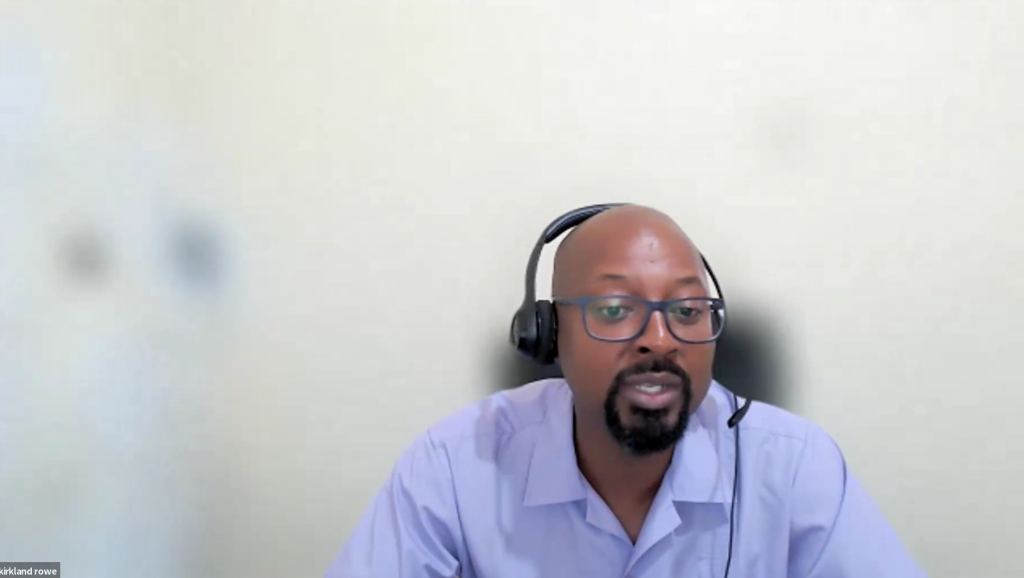
Dr. Kirkland Rowe, Senior lecturer, School of Engineering, Faculty of Engineering and Computing and Chairman of the Symposium’s Planning committee provides an overview of the Sustainable Futures Symposium held on Thursday, June 5, 2025.
Dr. Kirkland Rowe, Senior lecturer, School of Engineering, Faculty of Engineering and Computing and Chairman of the Symposium’s Planning committee provided an overview of the Sustainable Futures Symposium. He described the event as a significant, “moment in the growing regional conversation on how the Caribbean can meaningfully participate in the global space ecosystem.” He reiterated that the space agenda is about creating tangible, ground-level opportunities for the Caribbean in areas such as climate resilience, disaster preparedness, STEM education, communication, and economic development.
Caribbean Space Visionary, Dr. Claire Nelson Calls for Sovereignty and Inclusivity in the Future of Outer Space
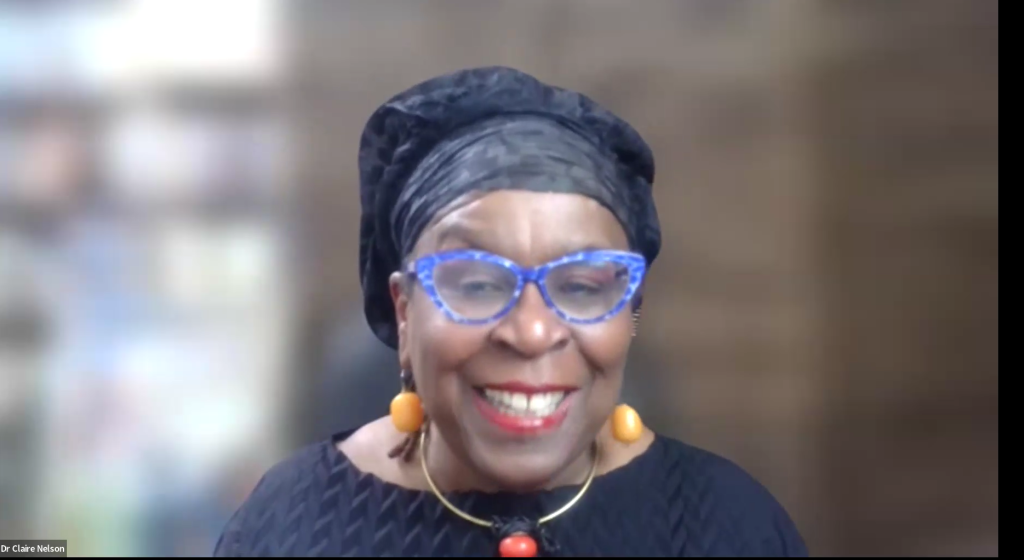
Dr. Claire Nelson, Chief Visionary Officer of The Futures Forum delivers her keynote address during the virtual “Sustainable Futures Symposium: Advancing a Caribbean Space Agenda” held on Thursday, June 5, 2025.
Chief Visionary Officer of The Futures Forum, Dr. Claire Nelson delivered an inspiring keynote address emphasizing the urgent need for the Caribbean region to actively participate in shaping the future of outer space. Dr. Nelson is listed among Forbes Top 50 Female Futurists and is Founding Convenor of the Omni Africa Space Exploration Analog Simulation and Space Ungana – Africa’s premiere space research and education gathering. She is also the Co-Founder of the Caribbean Space Society, recognized by ASCEND for her advocacy for space sustainability, and serves as Advisor to various groups including Institute of Space Law and Ethics, Space for Humanity and ShakthiSat.
Why the Caribbean Needs a Space Agenda?
Dr. Nelson began her presentation by reflecting on the critical question that sparked her journey into space advocacy: How do we share the future? Expressing deep concern over humanity’s trajectory toward “overshoot” and exceeding the planet’s safe boundaries, she highlighted outer space as a strategic frontier not for colonization or exploitation but for “sustainability, resilience, and sovereignty.”
Why the Urgency for SIDS?
Focusing on the unique challenges faced by Small Island Developing States (SIDS) like those in the Caribbean, Dr. Nelson underscored how space technologies underpin critical sectors including hurricane forecasting, disaster response, and enlarging the blue economy and the sustainable use of ocean resources. She explained that SIDS nations often lack sovereign infrastructure or cloud hosting capacity, with most of their data stored on foreign-owned servers or collected by international satellites. This makes data sovereignty crucial for effective disaster resilience planning, blue economy governance, health systems modernization, and the decolonization of digital development.
Why a Space Agenda Matters for the Caribbean?
Tracing the Caribbean’s early involvement in space, Dr. Nelson pointed to initiatives such as Barbados’s participation in the 1962 Project HARP (High Altitude Research Programme) and recent steps toward regional cooperation through the establishment of the Latin America and Caribbean Space Society in 2021.
With privatization and commercialization accelerating, Dr. Nelson emphasized the critical need for Caribbean nations to build sovereign capacity in satellite technology, data management, cyber security, and space law to avoid dependence on external powers. She called for regional collaboration to develop policies, legal frameworks, and infrastructure that support resilience, innovation, and ethical governance.
“Inclusion in the New Space economy helps build resilience, digital equity and sovereignty,” said Dr. Nelson. She added, “we want to ensure that as AI becomes more and more involved in these systems, that we ensure that there’s cultural and ethical sovereignty that we can involve in the processes of designing the rules and the norms that shape the global ecosystem and how space data is used.”
Addressing the ongoing race to establish lunar settlements, Dr. Nelson warned against the Moon becoming a playground for the ultra-rich and stressed the need for equitable governance to preserve cultural heritage and planetary protection. She urged SIDS needs to unite through platforms like the Alliance of Small Island States, “to support a lunar commons framework to ensure we have literacy.”
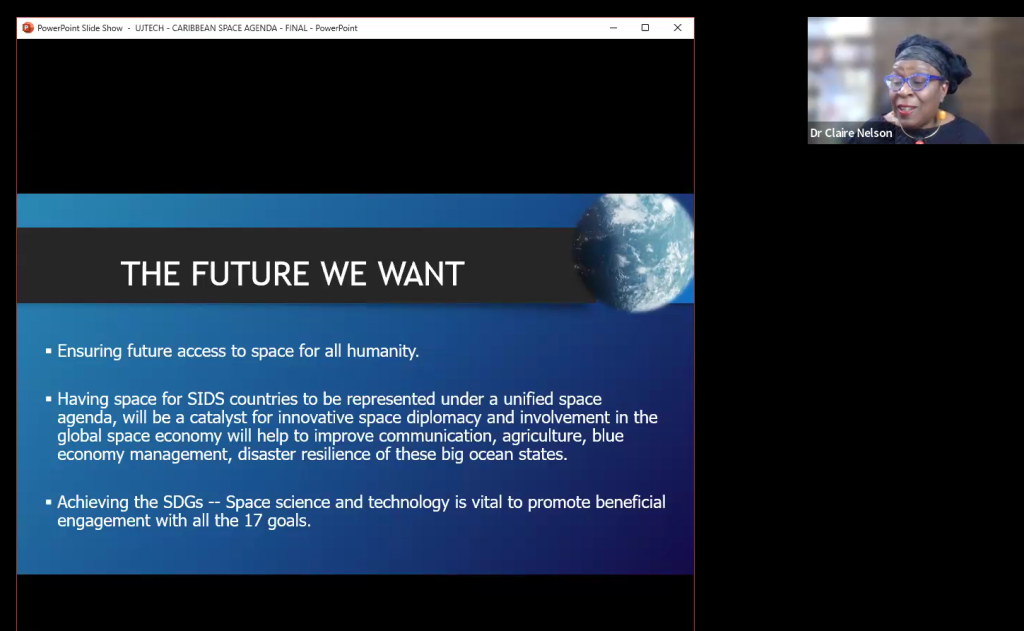
Dr. Nelson affirmed the “fierce urgency of now” for the Caribbean to claim its rightful place in the space domain. “The sky is not the limit, it’s simply just the starting point,” she declared. “We must not wait to be invited to the table of nations; we must indeed create our own table and bring up our own chair.”

The programme included several key plenaries and dialogues. Plenary One, titled “The Future We Want,” was moderated by Dr. Kevin Brown, President, UTech, Ja. It featured a panel including Mr. Kishan Khoday (left), Resident Representative for the United Nations Development Programme (UNDP) Multi-Country Office in Jamaica, and Dr. Paloma Mohamed Martin (right), Vice Chancellor, University of Guyana.
Mr. Kishan Khoday called for the establishment of a regional “futures lab” to harness the Caribbean’s unique marine and ecological assets such as deep-sea vents for contributions to space science, including astrobiology. Emphasizing that space and development will be central to the post-2030 agenda, he urged investment in technology transfer and policy readiness. Professor Paloma Mohamed Martin, added that achieving “the future we want” requires cultural shifts and educational reform, including normalizing space discourse and creating a technology-focused curriculum to inspire the next generation. She warned that without political commitment and coordinated regional leadership possibly through CARICOM, the Caribbean risks exclusion from future legal, scientific, and economic benefits in space. Both space enthusiasts agreed that shaping “the future we want” demands proactive action today to secure a sustainable, inclusive space future for the region.

Plenary Two, a Roundtable Dialogue “Space in Action,” was moderated by Alana Ali (left), Director of the Caribbean Space Society and Focal Point for the Caribbean Futures Forum in Trinidad and Tobago. Panelists included, Dr. Glendon Newsome (centre), Acting Vice Dean, Faculty of The Built Environment, UTech, Ja., and Dr. Vickram Bissonauth (right), Research Coordinator at the Mauritius Research and Innovation Council.
The discussion centered on the urgent need to shift from tool creation to effective utilization and collaboration within the Caribbean’s space and data ecosystems. Dr. Valrie Grant raised a key challenge—why existing tools remain underused which prompted responses that emphasized inter-institutional collaboration, data sharing, and strategic partnerships. The discussion called for a paradigm shift: treating space not as a distant ambition, but as a practical, unifying tool for addressing regional challenges like climate resilience and sustainable development.
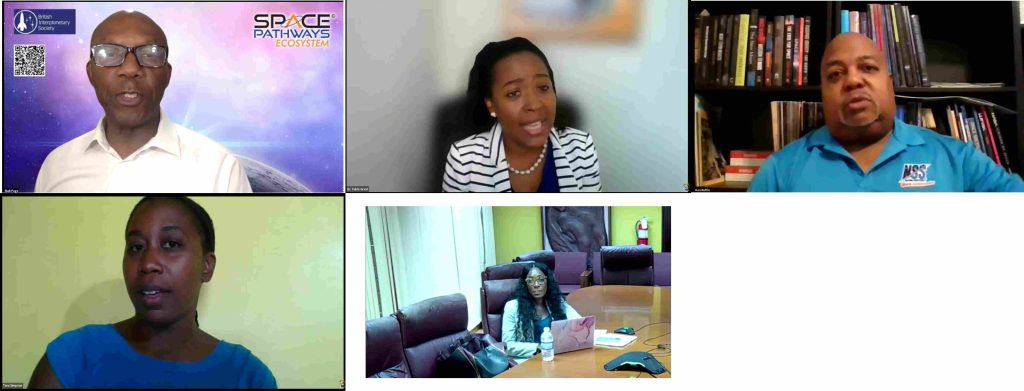
Plenary Three, “Building the Ecosystem – Stories from the Field,” was moderated by Mr. Rudi Page (top left) of Space Pathways Ecosystem. The panel consisted of (from left) Dr. Valrie Grant, Founder of Geotech Vision; Mr. Ken Ruffin, President of the National Space Society, USA, Ms. Tora Simpson from the Northern Caribbean University Space Advocates Club, and Dr. Meredith Beckford Smart, STEM Education Expert from the Caribbean Space Society.
The discussion highlighted the importance of building a strong, inclusive space ecosystem in the Caribbean through workforce development, education, and community-driven projects. Key takeaways included the need for culturally relevant, STEM education that connects local knowledge with global innovation; the critical role of mentorship and partnerships between schools, universities, and industry; and the urgency of using data-driven approaches to guide sustainable growth. The panel emphasized empowering youth as “space changers” by integrating skills in biotech, robotics, electrical technology, and space sciences, while fostering leadership and systems thinking to create pathways for careers in space and environmental science across the region.
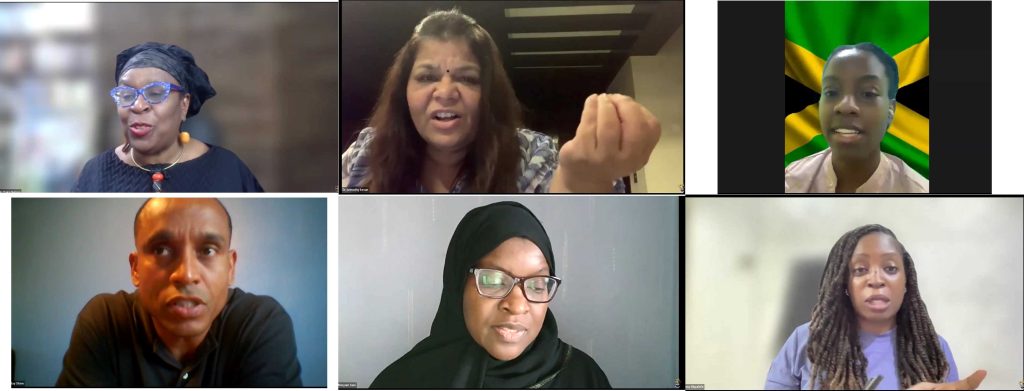
The final Plenary, “Where Do We Go From Here? – Next Gen,” was moderated by Dr. Claire Nelson (from left), Chief Visionary Officer of The Futures Forum. This session included an overview of Mission ShakthiSat led by Dr. Srimathy Kesan from SpaceKidz India. Other panelists were Dominique Campbell, ShakthiSat Ambassador for Jamaica and Director of the Caribbean Space Society, Jay Shaw, Director of NSBE Aerospace Caribbean Special Interest Group, Dr. Maryam Sani, Education Lead for the Space Prize Foundation and Alma Okpalefe Esq., Executive Director of the World Space Week Association.
Dr. Srimathy Kesan shared that ShaktiSat was born out of a vision to “create a scientific movement, especially in the space industry.” The goal is to build awareness and inspire the next generation especially young women to engage with science and space exploration in a collaborative manner.
Dr. Kesan explained that the initiative is designed to unite 108 countries, symbolically “holding hands with each other” in a spirit of global collaboration. From each of these countries, 108 girls, a total of over 12,000 high school students will be educated in the fundamentals of satellite technology and space science. Ultimately, one student from each participating country will be handpicked and brought to India, where they will work together to build a payload destined for the Moon. This bold and inclusive initiative underscores Mission Shakti’s core values: empowering girls, promoting peace through science, and inspiring a collaborative future in space exploration.
Panelists Dominique Campbell and Jay Shaw emphasized the importance of building Caribbean-led space ecosystems, while Dr. Maryam Sani highlighted the Space Prize Foundation’s free educational resources and mentorship programmes designed to broaden participation in the space sector. Alma Okpalefe of the World Space Week Association underscored the role of inclusive, globally synchronized events in sparking national space ambitions. Together, the panel stressed the urgency of intentional action, collaboration, and persistent outreach to cultivate a new generation of diverse space professionals.
Dr. Brown noted, “We need greater partnership and we need our academics here in the Caribbean to engage with the topic.” The University of Technology, Jamaica, will continue to lead Caribbean space agenda discussions and is committed to working with partners across the Caribbean to position the region as a meaningful player in the emerging global space economy. To contribute to the discussion around space in the Caribbean, UTech, Jamaica is currently looking to establish a UTech Student Space Club, establish the Caribbean Space Research and Innovation Centre (CSRIC) and identify and connect with key partners.
Watch Recording of UTech, Ja. Sustainable Futures Forum 2025: Advancing A Caribbean Space Agenda
End.
Contact:
Michelle Beckford (Mrs.)
Corporate Communications Manager
University of Technology, Jamaica
Telephone: (876) 970-5299
Email: mbeckford@utech.edu.jm

